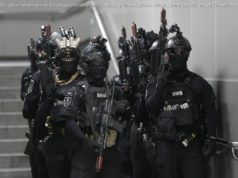Alaskans are not afraid of missiles from North Korea despite the hermit kingdom’s recent missile tests reveal they are capable of hitting the state. Alaska is by far the closest state to the…
Alaskans are not afraid of missiles from North Korea despite the hermit kingdom’s recent missile tests reveal they are capable of hitting the state. Alaska is by far the closest state to the rogue communist state, and therefore the most likely target should Kim Jong-Un decide to attack the United States with his current arsenal.
People in the state view missile strikes as less threatening that the environment. For those living there, avalanches, bear maulings, severe storms, and earthquakes are a much more tangible threat than a crazy man with an even crazier haircut having his finger on a nuclear stockpile.
Washington Post reports that Anchorage’s own mayor, Ethan Berkowitz, even quipped that he’s more worried about moose than missile and bears rather than bombs. This comes from the man who is in charge of the state’s largest city, a city of over 300,000 people who are in range of a nuclear missile.
Residents of the far-flung settlements are far more concerned about the outdoors than a country half-a-world away. It’s summer, the rivers are teeming with fish from the salmon run.
“It’s not something that keeps me up at night, ” said Christine Homan who was sitting at the counter of Wild Scoops ice cream shop. The elementary school teacher was busy enjoying a few scoops of handcrafted Alaskan ice cream with her husband and two sons to be worried about missile strikes reports the Alaska Dispatch News.
Todd Sherwood, who was also enjoying his frozen treat at the same establishment, served in the US Air Force for 15 years before becoming an attorney. He says that should North Korea decide to attack the United States, the reaction of the military will be “disproportionate” and severe.
Perhaps this is what makes him worry more about falling from his paddleboard on a glacier than the possibility of nuclear annihilation. The same sentiment is apparently shared by most of the people living in the perpetually snow-covered state.
There have been many times in the state’s history where its people felt deep anxiety about foreign threats. Since its acquisition from Russia, the state has had its fair share of threats from other countries, even more so than the rest of the United States says journalist and historian Michael Carey.
However, the first real threat to Alaska was in World War 2 when Japanese bombed the islands to distract the American navy currently in Midway. Two of its islands were also occupied by the Japanese during the war.
This information was largely unknown to most people living in the lower 48 states who to this day believe that Japan never set foot on American soil. The onset of the Cold War also brought with it fears of attacks due to the state’s proximity to the Soviet Union.
The 50s and 60s gave way to civil defense drills, siren tests, blackout curtains as well as radioactive isotopes in milk because of atmospheric nuclear testing. Some homes in Anchorage still have Cold-war era shelters with many people remembering the fear of being the closest state to Russia.
According to the Fairbanks-born Carey, this is the reason behind the state’s dismissive attitude to the missile threat from North Korea. Add to that the living conditions in the state and fears of a distant country take the backseat to the fears of what could happen as people go through their day.
Alaska is also home to military bases which are manned by men and women who have been trained for such a threat. The strategic nature of these bases according to retired fire captain Ben Clayton has been the reason why its people are well-trained and well-practiced.
The threat of nuclear annihilation has been a constant one for Alaskans. Over the years, they have learned to cope with it and focus instead on the things that the state has to offer for those brave enough to live in this beautiful but isolated region.
[Featured Image by South Korea Defense Ministry/AP Images]






